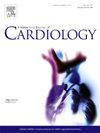Reoperative mitral valve surgery in the UK: 20-year trends and early outcomes
IF 3.2
2区 医学
Q2 CARDIAC & CARDIOVASCULAR SYSTEMS
引用次数: 0
Abstract
Introduction
Mitral valve surgery has undergone significant expansion and improvement in early in-hospital mortality over the last 20 years. At the same time, a considerable decline seems to have occurred in reoperative mitral valve surgery, which remains a relatively high-risk procedure. We investigated the trends, early outcomes and predictors of complications in patients undergoing RMV over 20 years in the United Kingdom.
Methods
The UK National Adult Cardiac Surgery Audit database was used to retrospectively analyse patients who underwent reoperative mitral valve surgery (n = 1239). These were then compared with a cohort of patients who underwent primary mitral valve surgery (n = 47,213) during the same period, from November 1, 1998, to March 30, 2019. We investigated in-hospital outcomes and examined predictors of adverse outcomes in patients undergoing reoperative mitral valve surgery.
Results
The proportion of reoperative mitral valve surgery out of all mitral procedures decreased significantly between 1999 and 2001, from 7.31 % to 3.44 %. After this time point, the percentage remained relatively steady, ranging from 1.8 % to 3.45 %. Of the 1239 reoperative mitral valve surgery, most were replacements 1127 (91 %). When compared to primary mitral valve surgery, reoperative mitral valve surgery were associated with a significantly increased mortality (13 % vs 5.2 %), requirement for dialysis (14 % vs 5.2 %), cerebrovascular event (CVE,2.4 % vs 1.2 %), return to theatre for bleeding (8.3 % vs 5.3 %) and increased length of stay (15 vs 11 days) (all, p < 0.001). After adjustment for baseline characteristics, reoperative mitral valve surgery was still associated with increased mortality (OR1.92; CI1.53–2.43; p < 0.001), CVE (OR1.32, CI1.05–1.65; p = 0.027) and dialysis (OR1.91; CI1.5–2.42, p < 0.001), compared to primary mitral valve surgery. The predictors for increased in-hospital mortality in the reoperative mitral valve surgery cohort were old age (OR 1.4, CI 1.00–1.08), creatinine >200 μmol/L (OR 3.86, CI 1.93–7.70, p < 0.001), need for emergency surgery (OR 2.18, CI 1.06–4.47, p = 0.034) and increased aortic cross-clamp time (OR 1.02, CI 1:00–1.03).
Conclusion
The incidence of reoperative mitral valve surgery has decreased in the UK over the first decade, most notably after 2001. Despite some variations, the volume remained steady in the second decade. Reoperative mitral valve surgery mortality and associated morbidity remain relatively high.
再手术二尖瓣手术在英国:20年趋势和早期结果。
简介:在过去的20 年里,二尖瓣手术在早期住院死亡率方面有了显著的扩大和改善。与此同时,二尖瓣手术的再手术似乎出现了相当大的下降,这仍然是一个相对高风险的手术。我们调查了英国20 年以上RMV患者的趋势、早期结局和并发症预测因素。方法:使用英国国家成人心脏手术审计数据库对二尖瓣再手术患者进行回顾性分析(n = 1239)。然后将这些患者与1998年11月1日至2019年3月30日期间接受初级二尖瓣手术的患者队列(n = 47,213)进行比较。我们调查了二尖瓣再手术患者的住院预后,并检查了不良预后的预测因素。结果:二尖瓣再手术在所有二尖瓣手术中的比例从1999年的7.31% %下降到2001年的3.44% %。在此时间点之后,百分比保持相对稳定,范围从1.8 %到3.45 %。在1239例二尖瓣再手术中,大多数为置换术(1127例,占91% %)。主要二尖瓣手术相比,再手术二尖瓣手术与死亡率显著增加有关(13 % 5.2 vs %),要求透析(14 % 5.2 vs %),脑血管事件(CVE, 2.4 vs 1.2 % %),回到剧院出血(8.3 vs 5.3 % %)和增加滞留时间(15和11 天)(200,p μmol / L(置信区间1.93 - -7.70或3.86,p 结论:在英国,二尖瓣手术再手术的发生率在第一个十年中下降了,最明显的是在2001年之后。尽管有一些变化,但在第二个十年中,数量保持稳定。再手术二尖瓣手术死亡率和相关发病率仍然相对较高。
本文章由计算机程序翻译,如有差异,请以英文原文为准。
求助全文
约1分钟内获得全文
求助全文
来源期刊

International journal of cardiology
医学-心血管系统
CiteScore
6.80
自引率
5.70%
发文量
758
审稿时长
44 days
期刊介绍:
The International Journal of Cardiology is devoted to cardiology in the broadest sense. Both basic research and clinical papers can be submitted. The journal serves the interest of both practicing clinicians and researchers.
In addition to original papers, we are launching a range of new manuscript types, including Consensus and Position Papers, Systematic Reviews, Meta-analyses, and Short communications. Case reports are no longer acceptable. Controversial techniques, issues on health policy and social medicine are discussed and serve as useful tools for encouraging debate.
 求助内容:
求助内容: 应助结果提醒方式:
应助结果提醒方式:


